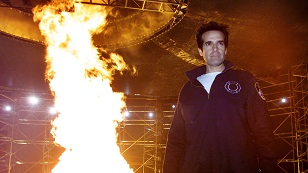This is mark Joseph “young” blog entry #489, on the subject of Battle Worlds.
With permission of Valdron Inc I have previously completed publishing my first nine Multiverser novels,
- Verse Three, Chapter One: The First Multiverser Novel,
- Old Verses New,
- For Better or Verse,
- Spy Verses,
- Garden of Versers,
- Versers Versus Versers,
- Re Verse All,
- In Verse Proportion, and
- Con Verse Lea,
in serialized form on the web (those links will take you to the table of contents for each book). Along with each book there was also a series of web log posts looking at the writing process, the decisions and choices that delivered the final product; those posts are indexed with the chapters in the tables of contents pages. Now as I am posting the tenth, In Version, written in collaboration with Eric R. Ashley, I am again offering a set of “behind the writings” insights. This “behind the writings” look may contain spoilers because it sometimes talks about my expectations for the futures of the characters and stories–although it sometimes raises ideas that were never pursued, as being written partially concurrently with the story it sometimes discusses where I thought it was headed. You might want to read the referenced chapters before reading this look at them. Links below (the section headings) will take you to the specific individual chapters being discussed, and there are (or will soon be) links on those pages to bring you back hopefully to the same point here.
This is the seventh post for this novel, covering chapters 73 through 84. Previous posts were:
- #476: Versers Deduce, covering chapters 1 through 12;
- #478: Character Conflicts, covering 13 through 24;
- #480: Versers Think, 25 through 36
- #482: Versers Engage, 37 through 48.
- #484: Characters Maneuver, 49 through 60.
- #487: A World in Space, 61 through 72.
There is also a section of the site, Multiverser Novel Support Pages, in which I have begun to place materials related to the novels beginning with character papers for the major characters, giving them at different stages as they move through the books.
History of the series, including the reason it started, the origins of character names and details, and many of the ideas, are in earlier posts, and won’t be repeated here.
Quick links to discussions in this page:
Chapter 73, Beam 178
Chapter 74, Kondor 238
Chapter 75, Brown 264
Chapter 76, Slade 233
Chapter 77, Beam 179
Chapter 78, Kondor 239
Chapter 79, Brown 265
Chapter 80, Slade 234
Chapter 81, Beam 180
Chapter 82, Kondor 240
Chapter 83, Brown 266
Chapter 84, Beam 181
Eric had expressed concern that there be continuity to the story after we versed people out, and I proposed that just as Derek is crashing the ship into the ocean Beam would arrive. I put him on the observation deck so he would understand where he was and to some degree what was happening. It was then only a matter of figuring out what he would see.
I decided that having Joe and Zeke see the descent of the ship would help move the story forward; also, at this point I figured that Derek would have left the ship, but since Beam was on it Kondor would detect the scriff sense of a verser and not know it wasn’t Derek.
We discussed this transition extensively before Eric put it together in this chapter. The idea was to bring them to a place similar enough to the university they left behind that it would make sense that they could arrive there on a botch, and to build a future universe parallel to the one they left but with the two races and several others living in some kind of harmony in an interstellar empire.
Eric provided information concerning several of the races included in this book.
In this chapter Derek meets Kelp 1942, which becomes a significant character as the book continues. Of the Kelp, Eric says those who go a-wandering and leave the great seas live in apartments filled with water. This gives them space to move about. However, if they want to be in public, they have to curl up and get in a floating diamondpane floater ball aquarium. They are curious. They also look for advantages in betting.
He also sees the Bilitate, which Eric describes as the Blue aliens from his earlier Multiverser book Beach with Dinosaurs. They 1. Have no long bones, only vertebrae and joints. 2. In order to stand, they have to continually stress their muscles so they are considerably stronger than they look. 3. They have airholes on the sides of their chests. 4. They can only see Blue and Black. They can see many more separate colors of blue than other races. A piece of paper to them would look just blue to us, but they could read the Shade 124 Blue letters on the Shade 256 Blue paper background. 5. They are low grade empathic with each other. 6, They will be seen in groups of four or multiples thereof. 7, Their reflexes are considerably slower than human, so much so that a fast moving human might appear to teleport to them. 8, In this setting, they are definitely one of the non-warrior races.
He also sees a Parakeet and a little green man, finally given the name Chlorophyte by me, both described earlier in this book and previous books in the series.
Eric carried this forward, gathering or creating four of the seven races–Parakeet (from my Verse Three, Chapter One), Chlorophyte (little green men from The Wanderer, in my Versers Versus Versers), Bilitate (from Eric’s previous Multiverser book Beach with Dinosaurs), Kelp, Dvander, and Dracorex–and then discussing the seventh with me, which led to the “second best at everything” race, which he named the Anders, pulling the name from the Greek. More detail is given about each race in the chapters in which they first appear.
Eric also wanted to introduce the gladiator games theme for Slade.
In this chapter Slade sees a Volungas balloon, which Eric describes as intelligent, indeed very highly so. But they rest, absorb sunlight, and at night lay on dirt to absorb minerals. Because of their vast size, they think very deep, very slow thoughts with massive memories. Most of them are older than the empire. If you have a week to talk to one, you can get some very great knowledge. Each of the hundred thousand of them is under the personal protection of the Emperor. They have only a passing presence in this book.
There is also a confrontation with a Dvander, for which Eric offered information: 1. Claws at ends of fingertips. 2. Very good at counterpunching. 3. Faster than human reflexes. 4. Let’s go with muscular. 5. Fan-like ears make it hard to sneak up on them, and they can hear heartbeats so once they understand their foe, they can predict moves by hearing heartbeats. 6. The ears have talons to defend themselves automatically. 7. Most Dvandar have a technological ear guard which keeps them from being sonically overwhelmed. 8. Ears also serve as cooling fans as a Dvandar can overheat. 9. Dvandar sometimes strike before they think, that is the reflexive bit. 10. 5 feet tall, say. 11. Thin skin. 12. Amphibians, sure. That adds interest. [Amphibian–frogs, newts?]
This was by way of orienting Beam to his new world and making it clear to the reader where he was. Although at some point he was going to encounter the little green men whom we were elsewhere calling Chlorophytes, I didn’t want too much to happen all at once, and was still contemplating whether when the Chlorophytes recognized these as the same creatures as the versers they would capture them or surrender to them.
Eric suggested that Turbirb’durpa would be able to find Kondor’s mind and communicate with him; I agreed that while this would be irregular, because Turb hears all thoughts around him and Kondor’s telepathic efforts to find Derek would be like shouting, it could be done. I also suggested the discussion about why Turb doesn’t teach Beam telepathy.
Eric constructed this chapter both to provide resources for the versers and to bring them into the challenge fight. We had to go back to clarify that “factory seconds” was a unit of currency based on the standard output of a factory per second, and that it did not refer to defective merchandise.
I decided that the opponent should be a Dvandar, not their best fighter but one of the top choices. Part of that was that I thought the Kelp wouldn’t have the influence to risk the life of a Dracorex, and although the Anders were the obvious second choice they were too like humans to make for an interesting fight. A quick chat with Eric brought us to agreement on a lot of the details of the appearance and abilities, although I took the amphibian aspect combined with the muscular physique to suggest the ability to make long fast jumps.
I suggested that we have Beam camp, and was uncertain whether it would get as far as them being discovered; it apparently didn’t. I also suggested that there should be a Kondor chapter and then Derek should watch Slade’s fight.
I was writing, but it was Eric’s suggestion that Kondor head to the coast to help with disaster relief. Since the world only recently got telegraphs and even trains were relatively new, it seemed this would be the first such disaster relief effort, although it was unclear what obstacles they might face.
I wanted to show this combat from Derek’s viewpoint, and it worked fairly well that way. It was a quick battle, but it was important to show Slade’s superiority.
It was obvious that Beam’s story wouldn’t really move forward until he was interacting with the aliens, but just as obvious that those same aliens had no reason to look for him, and particularly none to look for him in what was essentially a wilderness preserve. Thus the best option I could see was a chance encounter, and I had to find a way to create one. The notion of an alien coming to the lake before dawn to fish made sense, and the fact that both Beam and Dawn have white hair would be significant.
This has been the seventh behind-the-writings look at In Version. If there is interest and continued support from readers we will endeavor to continue with more behind-the-writings posts and another novel.









